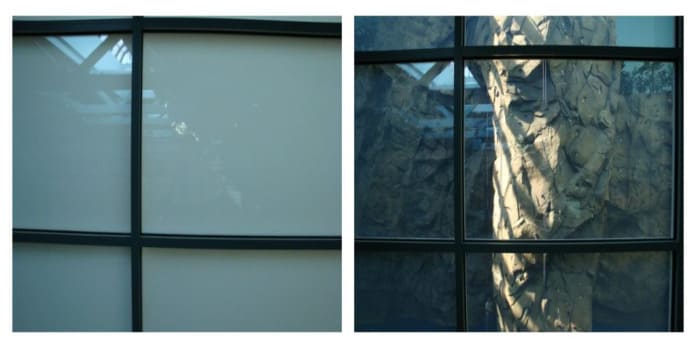Switchable smart film, also known as switchable privacy film or smart window film, is a technologically advanced material that can change its transparency from clear to opaque with the application of an electrical current. This film is often used in windows and glass partitions to provide privacy on demand while maintaining the ability to switch back to a clear state when privacy is no longer needed.
How It Works
Switchable smart film operates based on polymer dispersed liquid crystal (PDLC) technology. Here’s a basic outline of the process:
Clear State:
When an electrical current is applied, the liquid crystals within the film align in such a way that light can pass through, making the film appear clear.
Opaque State:
When the electrical current is turned off, the liquid crystals scatter randomly, diffusing light and making the film appear opaque or frosted.
Key Features
Privacy on Demand: Instantly switch between clear and opaque states.
UV Protection: Blocks harmful UV rays.
Energy Efficiency: Helps in reducing energy consumption by controlling solar heat gain.
Noise Reduction: Provides some degree of sound insulation.
Customizable: Can be cut to fit various window sizes and shapes.
Applications
Residential:
Windows: Enhance privacy without compromising natural light.
Bathrooms: Switchable privacy for shower enclosures and bathroom windows.
Bedrooms: Added privacy for large windows or sliding doors.
Commercial:
Office Partitions: Create private meeting rooms or workspaces that can switch to open-plan layouts when needed.
Conference Rooms: Ensure confidentiality during meetings.
Retail Stores: Dynamic storefront displays that can change transparency.
Healthcare:
Patient Rooms: Provide privacy for patients while allowing clear visibility when required.
Operating Theatres: Maintain sterile environments with the ability to control visibility.
Hospitality:
Hotel Rooms: Enhance guest experience with privacy windows and partitions.
Restaurants: Create private dining areas that can be opened up when not in use.
Automotive:
Car Windows: Privacy on demand for passenger windows and sunroofs.
Commercial Vehicles: Security and privacy for cargo areas.
Advantages
Flexibility: Can be retrofitted to existing glass surfaces or integrated into new constructions.
Aesthetic Appeal: Maintains a sleek and modern look.
Safety: Acts as a shatter-resistant layer, holding glass fragments together in case of breakage.
Control Options: Can be controlled via wall switches, remote controls, or even smartphone apps.
Considerations
Cost: Initial installation can be expensive, though costs may be offset by energy savings and enhanced functionality.
Power Requirement: Requires a continuous power supply to maintain the clear state.
Durability: Quality and lifespan can vary based on the manufacturer and installation quality.
Installation
Professional Installation: For optimal performance and longevity, it is recommended to have the film installed by professionals.
DIY Kits: Available for smaller projects or those with experience in handling such installations.
Conclusion
Switchable smart film is a versatile and innovative solution for modern privacy and energy efficiency needs. Its ability to toggle between transparent and opaque states makes it suitable for a wide range of applications in residential, commercial, healthcare, hospitality, and automotive sectors.



